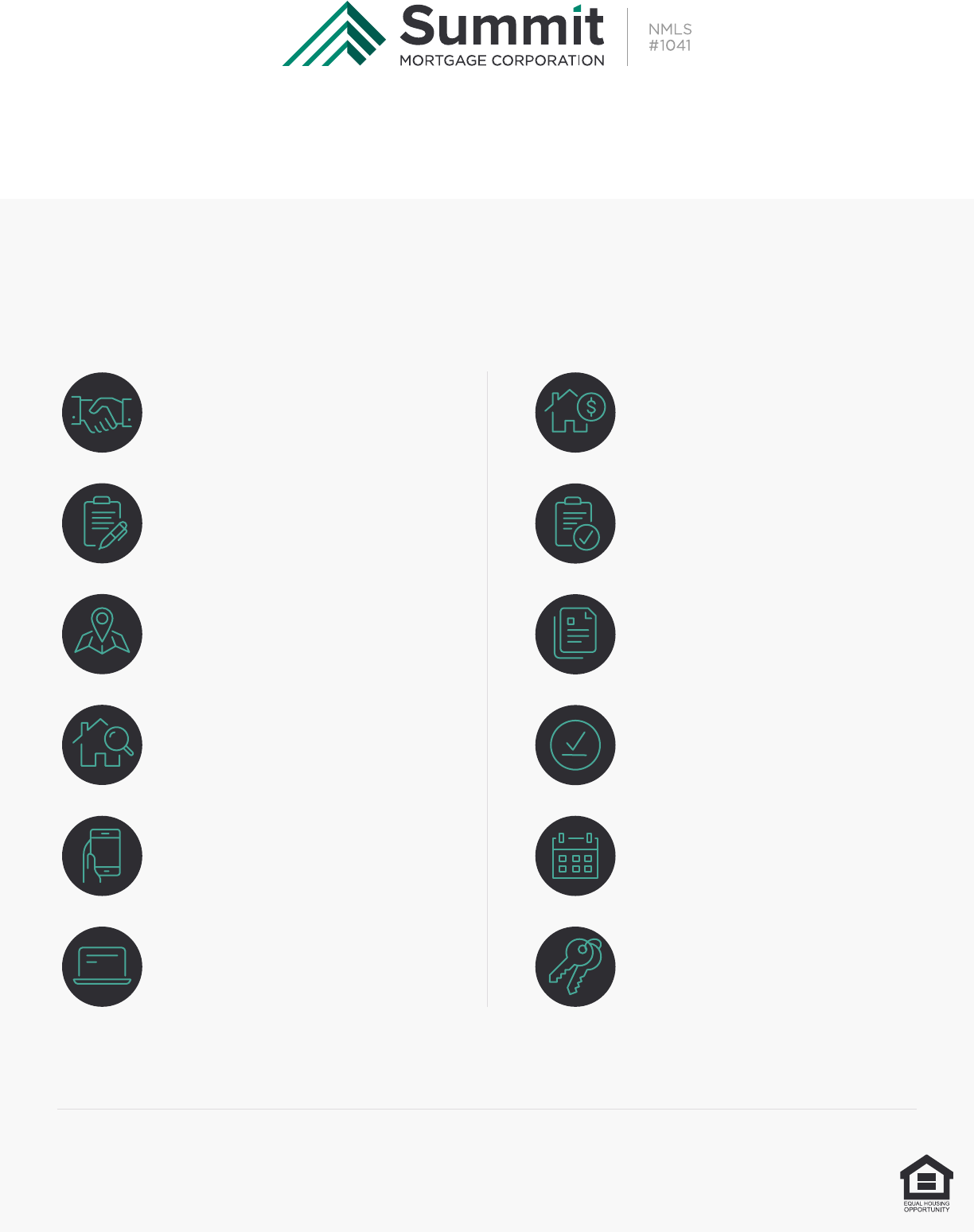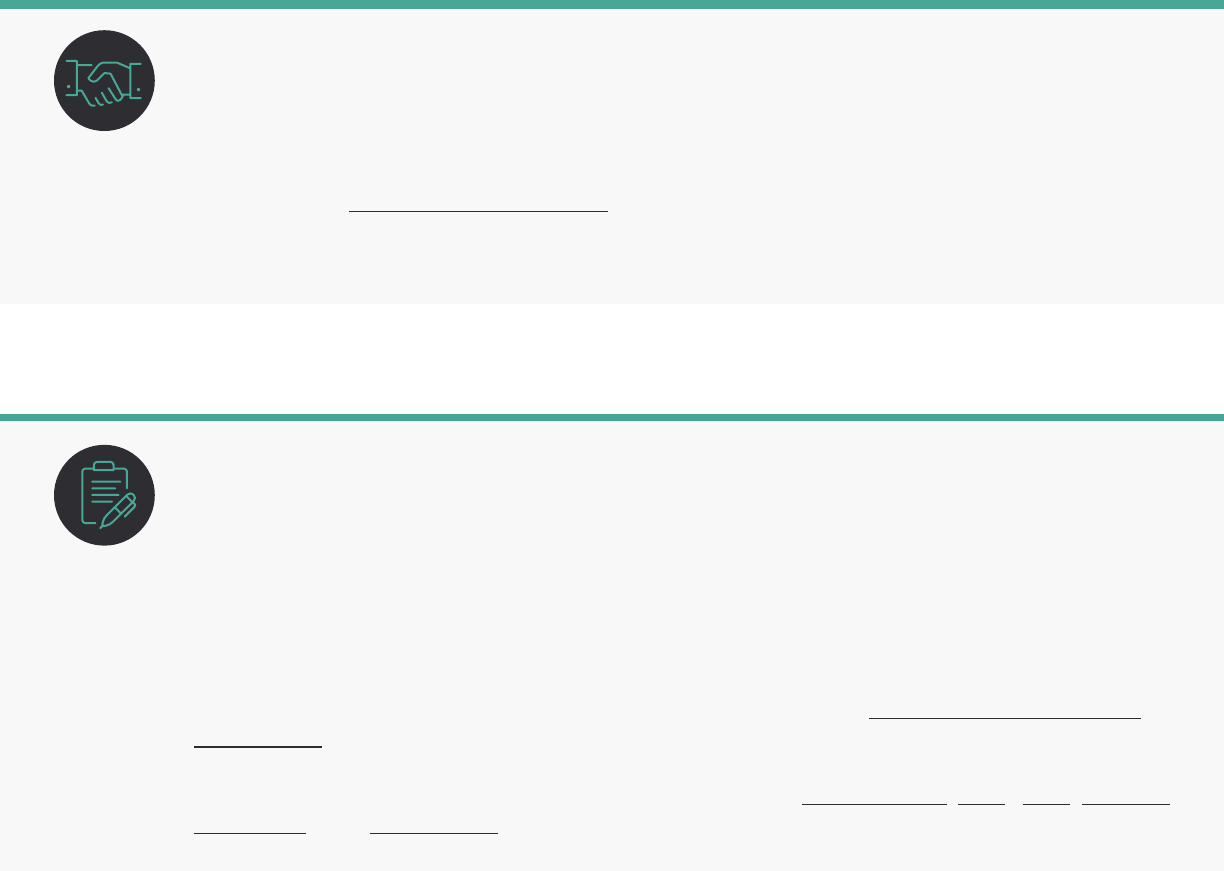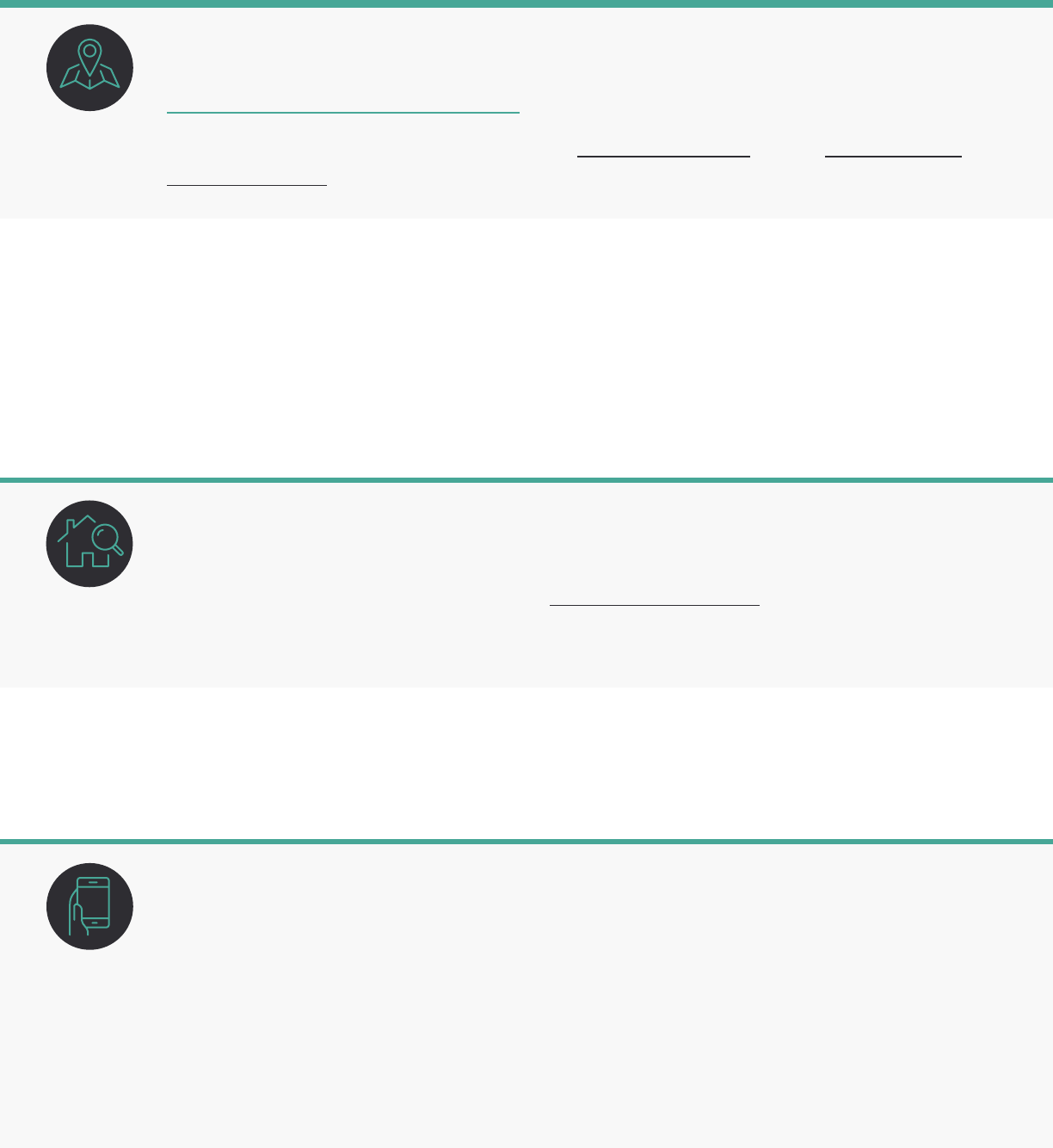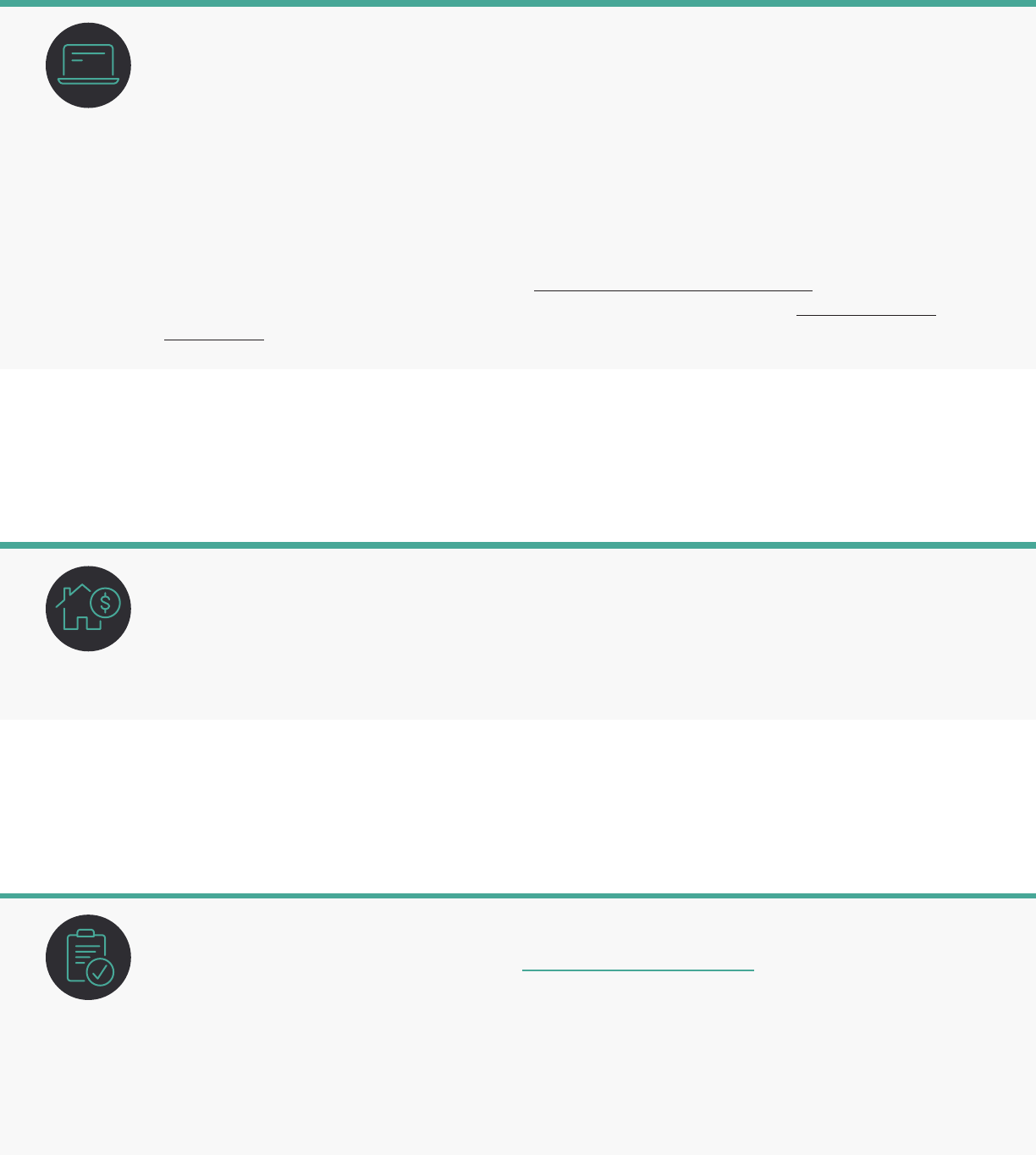
HOMEBUYER GUIDE
11. NUMBERS REVIEW
10. CLEAR TO CLOSE
6. PROCESSING
8. UNDERWRITING APPROVAL
3. FINDING YOUR HOME
4. INSPECTION
5. LOAN APPLICATION
9. CLOSING PACKAGE
7. APPRAISAL
12. CLOSING DAY
1. INITIAL CONSULTATION
2. PRE-APPROVAL
Whether you’re a new or seasoned homebuyer, often we need
reminders on how the process works. Let’s get you that new set of keys!
Updated: 03/20/2019
NMLS ID #1041 (www.nmlsconsumeraccess.org); CA – Licensed by the Department of Business Oversight under the California Residential
Mortgage Lending Act; MN – This is not an offer to enter into an agreement. Any such offer may only be made in accordance with the
requirements of MN. Stat. Section 47.206 (3) and (4); NJ – Licensed by the N.J. Department of Banking and Insurance; WA – CL-1041

1. INITIAL CONSULTATION
We’ll outline your buying potential.
We will inquire about your income, assets, liabilities and credit so we can assess
your current debt-to-income ratio and determine a qualifying payment or
purchase price. At this time we will also be asking you questions to determine
your needs and goals for the home purchase.
Debt-to-income ratio: This is a key ratio used to determine the amount of money you can
borrow. It’s your monthly payment obligation divided by your gross monthly income.
2. GETTING PRE-APPROVED
Provide all requested documentation (a list of typical
documentation follows on page 3 of this guide).
Pre-approval is not required to start home shopping, but we highly suggest
getting approval beforehand so you can shop in confidence. In a competitive
buying environment, pre-approvals can often times have the upper hand in
multiple offer situations. Summit Mortgage also offers a $10,000 underwriting
guarantee* to approved buyers which can make your offer stand out
against others. Pre-approval is based on your provided documentation. This
documentation provides information such as your credit score, PITI, PMI, escrow
payment, and loan types.
$10,000 underwriting guarantee: *For qualifying borrowers, if your loan doesn’t close, we’ll pay
the seller $10,000 out of our own pocket. Some limitations may apply.
Credit score: Your credit score is a major factor in determining if you’ll be approved for a home
loan. It will also impact the interest rate you qualify for. There are three major credit bureaus:
Equifax, Experian, and TransUnion. Data from your credit score is categorized into five major
elements that make up your credit score: payment history, amounts owed, length of credit
history, new credit, and types of credit used.
PITI: An acronym for the total mortgage payment, which is made up of Principal, Interest, Real
Estate Taxes, and Insurance.
PMI (Private Mortgage Insurance): Insurance provided by a private company to protect the
mortgage lender against losses that might be incurred if a loan defaults.
Escrow payment: An amount paid along with monthly mortgage payment for items such as
taxes or homeowners insurance.
Loan types: There are many types of mortgages available. Your Summit Mortgage loan officer
will help you understand your options so that you can make an informed decision. Use the table
on the next page as a guide.

LOAN TYPE FEATURES WHO MAY BENEFIT
Fixed-rate mortgage
·Predictable monthly payments.
·Rate will remain the same over
the entire term.
Buyers who plan to live in the
home for a long period of time or
want predictable payment.
Adjustable-Rate Mortgage
(ARM): The rate may go up
or down on pre-determined
dates reflecting current market
conditions.
·The initial interest rate is
generally lower than that of a
fixed rate.
·The initial interest rate is locked
in for a fixed period of time.
·There are different introductory
periods of time to choose from
(e.g. 5-year, 7-year, 10-year).
·After the introductory period,
the rate can adjust every year.
Buyers that would like to have
a lower monthly payment
compared to a fixed-rate
mortgage.
FHA Loan: The Federal Housing
Administration designed these
loans to meet the needs of low or
moderate incomes.
·Low, 3.5% minimum down
payment required.
·Flexible qualifying guidelines.
Buyers looking to make a lower
down payment or have limited
funds for a down payment.
VA Loans: The Department of
Veterans Affairs guarantees loans
for qualified veterans.
·100% financing on qualified
transactions.
·Gift funds can be used for all or
a portion of the down payment
and closing costs.
·No mortgage insurance required.
Active-duty service members
and veterans and surviving
spouses who have not remarried.
USDA Loans: Guaranteed by the
US Department of Agriculture.
·Low or no down payment.
·Flexible qualifying guidelines.
·Property must be located in
qualifying rural area.
·Maximum income based on
geographic area.
Buyers who live outside
metropolitan areas and are
looking to make a lower down
payment.
Conventional Loans: Fannie Mae
and Freddie Mac conforming &
non-conforming loans.
·Low down payment with
mortgage insurance on
conforming loan limits.
·No MI with 20% down.
Buyers with more money to put
down and lower debt-to-income
ratios.
HomeReady(R) & Home
Possible(R)
·Low down payment
·Lower mortgage insurance than
traditional conventional loans.
·At least one borrower must
complete homebuyer education.
Buyers with low or moderate
monthly income or have limited
funds for a down payment.
HomePath: Fannie Mae Real
Estate Owned (REO) properties.
·Low down payment
·No mortgage insurance
·No appraisal.
Investors who want to purchase a
pool of foreclosed properties with
the intent to renovate and rent
the properties.
Down Payment Assistance
Programs: funded by private
and public partnerships,
organizations either state, county
or city sponsored, non-profit
entities, etc.
·Low down payment first
mortgages or stand alone 2nd
mortgages.
·Income limitations.
Buyers who need help covering
down payment and/or closing
costs.

DOCUMENT CHECKLIST
Purchase Property Information
The address of the property being purchased, if you have it, along with the purchase price
Estimates of annual property taxes, homeowner’s insurance and homeowner association dues (if any).
A purchase contract signed by all parties (Purchase Loan).
Homeowners insurance information, including the agent’s name and phone number
Additional Assets: This is how you’ll demonstrate to lenders that you’ll be able to fund
your down payment and any closing costs.
Bank account balances including retirement accounts.
Gift donor information (if applicable).
Settlement statement (if using funds from the sale of a property).
Sale of assets documentation (proof of ownership, proof of sale, proof of funds transferred/deposited).
Mortgage Statements for all properties owned.
Income and Identity Information: This is how you’ll demonstrate to lenders that you
are who you say you are and that you receive a regular income and will be able to
afford the monthly mortgage payments.
ALL HOMEBUYERS MUST PROVIDE:
Full legal name, social security number and date of birth.
Current driver’s license or other government-issued photo ID.
Residence history for the past two years, phone number and email address.
Employment history for the past two years.
A written explanation if you have been employed less than two years or if employment gaps exist.
Primary and secondary sources of income.
Bank account balances including retirement accounts.
Source of funds documentation for any large deposits on bank statements.
Divorce Decree/Marital Settlement Agreement (if applicable).
W2 EMPLOYED APPLICANTS MUST PROVIDE:
W-2 statements from the last two years.
Pay stubs fore the past 30 days.
Federal tax returns (1040s) for the past two years, all pages.
SELFEMPLOYED APPLICANTS MUST PROVIDE CORPORATION OR PARTNERSHIPS:
Business tax returns for the past two years, all pages, including K1 statements.
A year-to-date profit and loss statement and balance sheet
Payment History: This is how you’ll demonstrate to lenders that you manage your
finances responsibly and make your debt payments on time.
Monthly debt obligations
Bankruptcy discharge paperwork for bankruptcies in your credit history.

3. FIND YOUR HOME, MAKE AN OFFER, SIGN THE
PURCHASE AGREEMENT
Ask your real estate agent about earnest money and seller-paid
closing costs.
Purchase agreement: This is the document received after mutual acceptance on an offer,
which states the final sale price and all terms of the purchase. The specific items in this
contract vary by state.
Earnest money: Buyer pays this to the seller before closing to ensure the buyer’s seriousness
about purchasing the home. This money is not an additional cost and will be credited towards
the purchase price at closing.
Seller-paid closing costs: Closing costs associated with your loan that are paid by the seller’s
proceeds to reduce out-of-pocket expenses for you.
4. HOME INSPECTION
You have the choice to order a home inspection at this time. Your
real estate agent will assist with ordering this and will let you know
the upfront cost of the inspection.
Home inspection: Your home inspection should be performed by an inspector who will educate
you and provide details on the home’s condition for existing and potential problems. While
home inspections are not mandatory, they are highly recommended so that you are aware of
problems before you decide to buy a property. These problems could result in offering a lower
purchase price, or moving on and finding a home that is better suited for you.
5. MORTGAGE LOAN APPLICATION
You’ve been pre-approved for a loan. You’ve found a home that
meets your needs, and you’ve made an offer to buy it. The seller
has accepted your offer.
Your loan officer will let you know what you will need to complete our loan
application. This is a straightforward step in the process, but necessary to
complete and send your status into the processing stage.

6. INITIAL PROCESSING
Once you have a purchase agreement and a completed loan
application, your file will move into the processing stage. This is
another important step in the loan approval process.
Loan processors collect a variety of documents from you, as well as the property
being purchased. They will review the file to ensure it contains all of the
documents needed for the underwriting process (step 7 below).
Consult with your loan officer about locking in your interest rate and sign your
initial disclosures. Also at this time, you will be asked to obtain homeowners
insurance.
Locking in your interest rate: A rate lock is a guarantee from a mortgage lender that they will
give you a certain interest rate, at a certain price, for a specific time period.
Homeowners insurance: An insurance policy that combines various protections for your new
home. Let your insurance agent know coverage will need to meet 100% of the insurable value
of the property.
7. HOME APPRAISAL
Once your offer is accepted, an appraisal will be ordered for your
new home.
Home appraisal: An appraisal provides valuable information for the buyer, but the appraiser’s
primary mission is to protect the lender. Lenders can’t lend more money than the property is
worth and that’s why the appraisal takes place before the lender grants final approval of the
buyer’s loan. The appraiser surveys the physical condition of the home and runs a comparative
analysis of similar homes recently sold. A copy of the appraisal report is always provided to the
buyer.
8. FILE IS SUBMITTED TO UNDERWRITING FOR APPROVAL
Keep in mind the underwriter may request a few additional items
for review prior to issuing the final approval.
At this stage, it is very normal to get additional requests to submit information.
If you have been requested to submit additional documents, be sure to get
everything back within 24 hours so there are no delays with your closing.
Underwriting: The process a lender uses to determine the risk of offering a mortgage loan
to a borrower. During this process the underwriter uses industry guidelines to analyze the
various aspects of the mortgage and provide recommendations regarding the risks involved.
Ultimately, it’s the underwriter who makes the final decision on whether to approve or decline
a loan.

9. CLOSING DISCLOSURE (CD) SIGNED AND CLOSING
PACKAGE SENT TO THE TITLE COMPANY
When you receive the CD, sign it as soon as possible so there are
no delays with your closing.
This is a form that gives you finalized details about your mortgage loan. It
includes the loan terms, your projected monthly payments, and the amount you
will need to pay in fees and other closing costs.
Title company: The title company verifies ownership of the property and determines the valid
owner through a thorough examination of property records in a title search. The title search
determines the legal owner of the property; reveals any mortgages, lien judgments, or unpaid
taxes outstanding on the property; and details any existing restrictions, easements, or leases
that affect the property. The title search ensures you’ll be the legal owner of the property and
we, as your lender, will be in first lien position.
10. YOU’VE HAVE REACHED A HUGE MILESTONE!
You’re so close to owning a home. Please be sure to stay in touch
with your loan officer about any last minute financial decisions.
11. FINAL NUMBERS REVIEWED
A few days prior to closing, we’ll contact you with the final
numbers.
You’ll have specific instructions on whether to obtain a cashier’s check and who
it should be made out to, or if a wire is needed for funds to close.
You’ll need to obtain this at least one day prior to closing. Each title company has
different requirements as to whether they will accept a cashier’s check or if you
need to have a wire transfer.
12. CLOSING DAY
Congratulations, it’s time to get your new keys!
Don’t forget your drivers license, your checkbook, and your funds for closing.
You’ll sign all of the final disclosures; note and mortgage. We’ll be there with your
closing agent to answer any questions. Once the documents are signed, the keys
will be yours!
